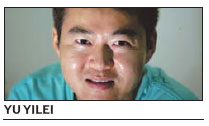Top News
Give Chinese guys a hand
By Yu Yilei (China Daily)
Updated: 2010-10-17 10:02
 |
Large Medium Small |

Let's give the Chinese men's tennis players a little bit of applause. We are now getting used to the women players having success on the tour, but their male counterparts finally raised a few eyebrows with a good showing at the Shanghai Rolex Masters, an ATP 1000 event.
World No 465 Bai Yan upset Czech veteran Radek Stepanek, a former world top-10 player, in straight sets and became the second player from the Chinese mainland to claim a victory in the main draw of the Shanghai event. Former national champion Zeng Shaoxuan was the first to do so, defeating Israeli Dudi Sela in three sets last year. Later world No 308 Zhang Ze was close to another upset victory before losing to former world No 3 Ivan Ljubicic in three sets.
As I watched Bai take on world No 4 Andy Murray in a second-round matchup on Wednesday, I suddenly realized the level of men's tennis in China was not as bad as I had thought.
Although Bai lost to Murray 6-2, 6-2, the Nanjing native displayed a delightful all-around game featuring smashing serves, fierce groundstrokes and electrifying footwork that, at times, made him look like a world top-100 player.
It was a marked difference from my previous memories of Chinese men taking on the world's top players as they acted like beginners and usually lost in quick fashion.
I could not help wondering what made them so much less successful than their female counterparts.
The physical conditioning of the Asian men is always cited as a reason. However, the emergence of NBA all-star center Yao Ming and Olympic and world champion hurdler Liu Xiang makes that a poor excuse, not to mention Chinese are always good at racquet sports.
I believe the key to success has already been shown on the women's side - good investment, high-level coaches, opportunities to play in high-level tour events and a good back-up team, including physicians and physios and trainers.
"You have seen the results on the women's side," 16-time Grand Slam winner Roger Federer told China Daily while attending "Swing for the Stars", a junior tennis development program launched by Mercedes-Benz and the Chinese Tennis Association (CTA).
"On the men's side, it's a lot slower. I think if you have the right sponsors, the right people and the right coaches around you, there is a very good chance to make it well."
I am happy to know the CTA has started to increase its input into men's tennis thanks to the financial gains brought about by the women's success.
Now I hope China's tennis can take this golden opportunity to produce its own Federer.
Yu Yilei is the sports editor of China Daily. You can reach him at yuyilei@chinadaily.com.cn